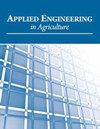农学新手Arduino教学设计:对兴趣、自我效能和知识的影响
IF 0.9
4区 农林科学
Q4 AGRICULTURAL ENGINEERING
引用次数: 1
摘要
HighlightsAn教学治疗的教学新手Arduino用户开发,测试,完善,并发现是有效的。修订后的教学治疗显著提高了新手用户使用Arduinos的兴趣、知识、自我效能和技能。在教学治疗的课堂部分结合小型“实践活动”被证明是有效的。研究结果支持将项目评估模型和自我效能理论作为教学发展的有效框架。摘要本研究采用程序评价模型和自我效能理论,开发、评价、修改、再评价两所农业学院旨在提高Arduino新手用户兴趣、自我效能和知识的教学治疗(课程和实践活动)。Arduino是一系列可编程的开源微控制器,广泛用于教育和研究。项目评估提供了一个教学发展的迭代模型,其中试点测试的结果用于指导教学和材料的改进,并在随后的测试中重新评估。自我效能理论认为,积极的掌握、替代和社会说服经验会增加对任务表现和主题兴趣的信心。在A大学的中试研究中(n = 27),最初的教学处理导致学生的面包板自我效能感和Arduino知识显著(p < 0.05)和大幅增加,但编程自我效能感和学习Arduino的兴趣没有增加。在B大学(n = 20)的重新测试研究中,修改了教学方法,将四项动手任务作为课程的一部分后,学生对Arduino、面包板自我效能感、编程自我效能感和Arduino知识的学习兴趣显著(p < 0.05)且大幅增加。本研究的结果表明,计划评估作为一种课程发展模式的效用,以及将小型实践活动纳入新手学习新技术技能的课程的有效性。最后,运用自我效能理论作为课程开发的框架进行验证。关键词:Arduino,微控制器,新手程序员,程序评价模型,自我效能理论,教学本文章由计算机程序翻译,如有差异,请以英文原文为准。
Designing Arduino Instruction for Novice Agriculture Students: Effects on Interest, Self-efficacy, and Knowledge
HighlightsAn instructional treatment for teaching novice Arduino users was developed, tested, refined, and found to be effective.The revised instructional treatment significantly increased novice users’ interest, knowledge, self-efficacy, and skills in using Arduinos.Incorporation of small ‘practice activities’ during the lesson portion of the instructional treatment was proven effective.The results support the use of the program evaluation model and self-efficacy theory as effective frameworks for instructional development. Abstract. This study employed the program evaluation model and self-efficacy theory to develop, evaluate, revise, and re-evaluate an instructional treatment (lesson and hands-on activity) intended to increase the interest, self-efficacy, and knowledge of novice Arduino users in two colleges of agriculture. Arduino is a line of programmable, open-source microcontrollers widely used in education and research. Program evaluation provides an iterative model of instructional development where the results of a pilot-test are used to guide refinement of instruction and materials which are reevaluated in subsequent test(s). Self-efficacy theory posits that positive mastery, vicarious, and social persuasion experiences lead to increased confidence in task performance and subject matter interest. In the pilot-test study at University A (n = 27), the initial instructional treatment resulted in significant (p < 0.05) and large increases in students’ breadboarding self-efficacy and Arduino knowledge, but not in programming self-efficacy or interest in learning about Arduino. After revising the instructional treatment to include four hands-on tasks as part of the lesson, the re-test study at University B (n = 20) resulted in significant (p < 0.05) and large increases in students’ interest in learning about Arduino, breadboarding self-efficacy, programming self-efficacy, and Arduino knowledge. The results of this study indicated the utility of program evaluation as a curriculum development model and the efficacy of incorporating small hands-on activities into lessons for novices learning new technical skills. Finally, use of self-efficacy theory as a framework for curriculum development was validated. Keywords: Arduino, Microcontrollers, Novice programmers, Program evaluation model, Self-efficacy theory, Teaching.
求助全文
通过发布文献求助,成功后即可免费获取论文全文。
去求助
来源期刊

Applied Engineering in Agriculture
农林科学-农业工程
CiteScore
1.80
自引率
11.10%
发文量
69
审稿时长
6 months
期刊介绍:
This peer-reviewed journal publishes applications of engineering and technology research that address agricultural, food, and biological systems problems. Submissions must include results of practical experiences, tests, or trials presented in a manner and style that will allow easy adaptation by others; results of reviews or studies of installations or applications with substantially new or significant information not readily available in other refereed publications; or a description of successful methods of techniques of education, outreach, or technology transfer.
 求助内容:
求助内容: 应助结果提醒方式:
应助结果提醒方式:


